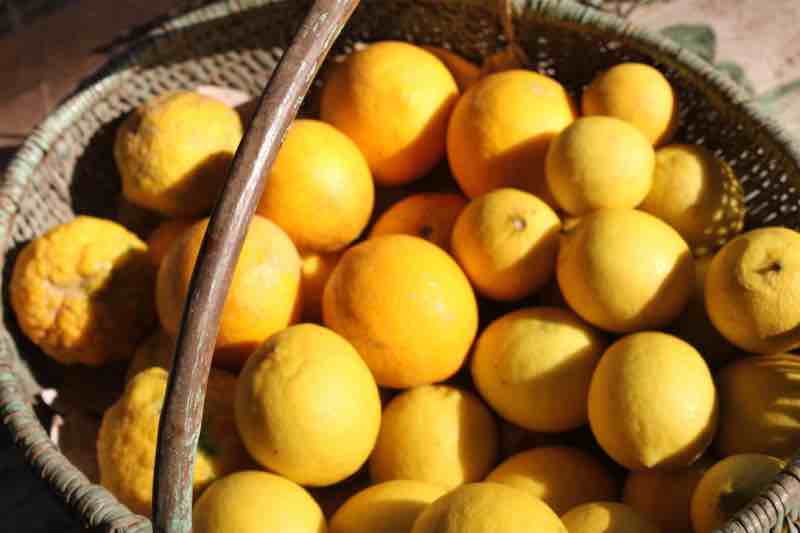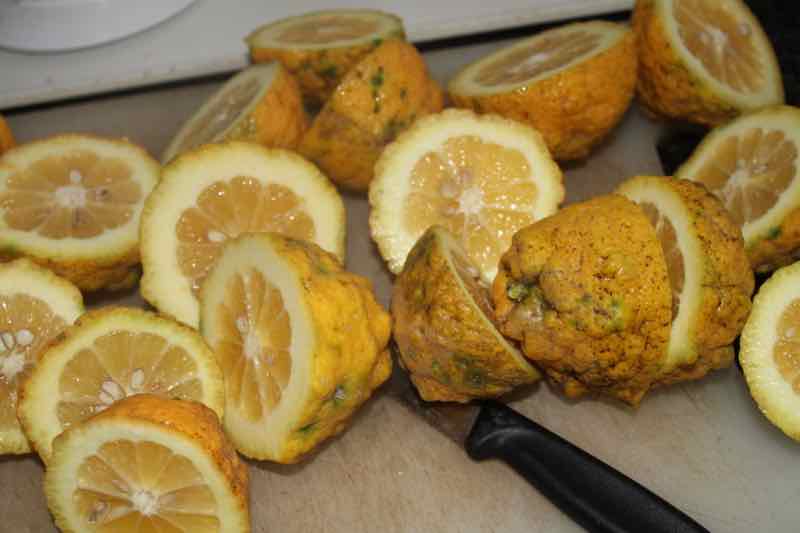- Homepage
- Our green kitchen
- Use the Lemon Pulp Too
Use the lemon pulp too
Use the lemon pulp too because it delivers far more nutrients and gives your food a rich and profound citrussy flavour.
If you were to scour old recipe-books and the constant deluge from the internet about slow food you would be astounded by the number that include lemon juice; like these herb and spice butters, for example.
From time immemorial citrus has been a choice food; and limes and lemons probably top the pops.
If you are a reader and love good-food, then "The Land Where Lemons Grow" will enthrall you; I have just found it as an eBook for R129 on Takealot. It’s a profoundly interesting journey through Italy describing the origins of this amazing fruit.

You probably know that British-sailors were called Limeys.
It was a very smart Scottish ship’s doctor, James Lind, who worked out that limes and lemons contained an unknown substance which prevented the scurvy that killed at least two-million sailors.
Whilst frank scurvy is not common today, early symptoms are feeling tired all the time, weakness and painful limbs; does any of that sound familiar?
How are you gums?
It was eventually discovered that a molecule, named vitamin C, was the active ingredient; it is absolutely essential to synthesise collagen[1], the fundamental building block of cells, as it is necessary for protein metabolism. It also has many other important functions in the body including balancing the immune system, relevant to all of us.
Limes are harder and so keep longer but both are excellent trees to have in any garden.

"A dietary pattern rich in fruits and vegetables is associated with better immune function and a lower risk of obesity, type-2 diabetes and cardiovascular disease; and some cancers."
- Tufts Health and Nutrition newsletter
But let's journey back to those recipes; what I find quite strange is that not once in all my reading have I found anything about using the lemon-pulp. It’s all about the juice.
But more than half of the goodies are to be found in the pulp. When you squeeze citrus, using a strainer, you lose a huge amount of the nutrients that would otherwise give you stronger gums; and ligaments that heal more quickly after injury.
In particular it is rich in two phytochemicals called lemonin and beta cryptoxanthin that scientists are getting excited about; they protect the brain against age-related dementia and Parkinson's disease.
Lemon and lime pulp should not go to the garbage. It ought rather to find its way to your stomach. So either squeeze them without a strainer, skimming off the pips; or peel them and cut up the whole fruit for your recipes. Interestingly the juice from a press contains even more vitamin C as it is found in the pith too.
And don’t throw away the skin. The zest adds so much flavour to your recipes and is a rich source of an amazing phytochemical called limonin[3]. It gives them their sour taste; tragically plant-breeders are trying to develop varieties that have less of the substance.
Why is it that we humans are so obsessed with sweetness and abhor sour? Viruses target people with raised blood-sugar.
Avoid preserved lemon juice; it tastes simply awful because of all the chemicals used to give it a longer life. If you don’t have have them in the garden, start planning to plant saplings this winter. They add so much zest to the taste of your food and really do strengthen your immune-system. Fresh fruit all year round is our goal.
Lemon-juice in your butternut soup for example and in making jams and jellies; it really does bring out the flavour.
This tabbouleh with broad beans would be so dull without the lemon pulp.
Scientists are busy trying to work out why the coronavirus hardly touches some folk but kills many others. It’s all about the immune-system.
Many of the lemons and limes from our garden go into our homemade hummus[2]; more about that next week. You can sign up for newsletters lower down promoting the concept of a Cyan Zone; caring for both your family and the planet.
Use the lemon pulp too
Use the lemon pulp too because that is where at least half of the nutrients are to be found. This kale and almonds salad for example is rather dull without the sweet and sour.
When browsing use right click and "Open Link in New Tab" or you may get a bad gateway signal.
The material expressed on this page is gleaned from the nutritional and environmental literature; it is clearly referenced. A plain distinction is made between the author's opinion and that which is scientifically proven. When in doubt consult your health professional.
To suggest a correction or clarification, write to Dr Bernard Preston here. Contact.
Newsletter
Our newsletter is entitled "create a cyan zone" at your home, preserving both yourself and Mother Earth for future generations; and the family too, of course. We promise not to spam you with daily emails promoting various products. You may get an occasional nudge to buy one of my books.
Here are the back issues.
- Lifestyle and ideal body weight
- What are ultra-processed foods?
- Investing in long-term health
- Diseases from plastic exposure
- Intensive lifestyle management for obesity has limited value
- A world largely devoid of Parkinson's Disease
- The impact of friendly bacteria in the tum on the prevention of cancer
- There's a hole in the bucket
- Everyone is talking about weight loss drugs
- Pull the sweet tooth
- If you suffer from heartburn plant a susu
- Refined maize meal and stunting
- Should agriculture and industry get priority for water and electricity?
- Nature is calling
- Mill your own flour
- Bake your own sourdough bread
- Microplastics from our water
- Alternative types of water storage
- Wear your clothes out
- Comfort foods
- Create a bee-friendly environment
- Go to bed slightly hungry
- Keep bees
- Blue zone folk are religious
- Reduce plastic waste
- Family is important
- What can go in compost?
- Grow broad beans for longevity
- Harvest and store sunshine
- Blue zone exercise
- Harvest and store your rainwater
- Create a cyan zone at your home
When browsing use right click and "Open Link in New Tab" or you may get a bad gateway signal.
Did you find this page interesting? How about forwarding it to a friendly book or food junkie? Better still, a social media tick would help.
- Homepage
- Our green kitchen
- Use the Lemon Pulp Too
Address:
56 Groenekloof Rd,
Hilton, KZN
South Africa
Website:
https://www.bernard-preston.com